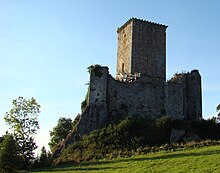
Andrade (/ɐ̃ˈdɾa.d͡ʒi/ (Brazil), [ɐ̃ˈdɾa.ðɨ] (Portugal), or [ãn̪ˈd̪ɾa.ð̞e] (Spanish)) is a surname of Galician origin, which emerged in the 12th century as the family name of the knights and lords[1][2] of the small parish of San Martiño de Andrade (St. Martin of Andrade), in the municipality of Pontedeume. The first mention of this small territory is to be found in the documentation of the monastery of San Xoán de Caaveiro (18 km away), and belong chronologically to the 9th century. It was part of the region of Pruzos, which was created as an administrative and ecclesiastical territory of Kingdom of Galicia in the sixth century by King Teodomiro (reigned 559–570) through a document written in Latin called Parrochiale suevum, Parochiale suevorum or Theodomiri Divisio. From the 12th century Pruzos, and therefore Andrade, were integrated into the county of Trastámara that belonged to the lineage Traba, the most powerful Galician family. By this same time the family group: Fortúnez, begins to unite their names Andrade as surname, since in this parish their family home was located. The knights of Andrade were faithful vassals of their lords the Counts of Trastámara throughout the middle centuries of the Middle Ages.
There is a notable Jewish branch which originated in Portugal in the 17th century as da Costa d'Andrade, and soon moved into England.[3] The surname Andrade is found predominantly in Portugal and Spain, and in countries of Latin America, Italy, Equatorial Guinea and East Timor, Goa, Philippines, and Karnataka in India. There is an important concentration of Andrade families residing in the United States, specifically, California, Massachusetts, Hawaii and Rhode Island.
- ^ Lamigueiro, José Luis. "Andrade, s. XI-XIV". Xeneaoxías do Ortegal. Retrieved 30 December 2016.
- ^ Correas Arias, José Francisco (2009). A casa de Andrade, 1160-1540 : nobreza, mentalidade e ideoloxía na Galicia baixomedieval (1a ed.). Noia: Toxosoutos. ISBN 978-84-96673-87-8.
- ^ "Andrade family history". www.pjohnp.me.uk.